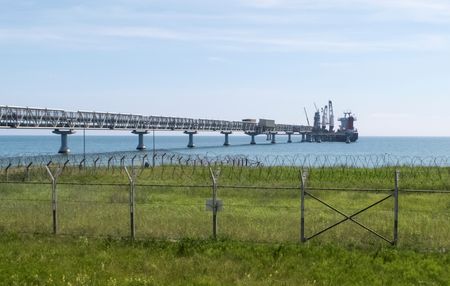
TOKYO (Reuters) -Shares in Japan’s Mitsui & Co and Mitsubishi Corp fell about 5% on Friday after Russia moved to create a new firm to take charge of the Sakhalin-2 oil and gas project in the country’s far east.
The new firm will take over all rights and obligations of Sakhalin Energy Investment Co, in which the two Japanese trading companies and Shell Plc hold just under a 50% stake, according to a decree signed by Russian President Vladimir Putin on Thursday.
The 5-page decree, which comes amid Western sanctions on Moscow over the invasion of Ukraine, indicates that it is up to the Kremlin to decide whether foreign shareholders are to remain in the consortium.
Mitsui has a 12.5% stake in the project and Mitsubishi 10%, while Shell holds 27.5%, minus one share. Russian gas giant Gazprom has 50%, plus one share.
Japan has previously said it would not give up its interests in the Sakhalin-2 project, which is important for its energy security, even if asked to leave.
Sakhalin-2 supplies about 4% of the world’s current liquefied natural gas (LNG) market. Japan, South Korea and China are the main customers for oil and LNG exports, according to Shell.
Asked about Putin’s decree, Japanese Deputy Chief Cabinet Secretary Seiji Kihara said the government was examining its contents and analysing Moscow’s intentions.
“Generally speaking, our country’s interests in resources should not be hurt,” he told a regular news conference, declining to say whether Japan was in contact with Moscow over the matter.
Japan continues to import LNG from Sakhalin-2.
Officials at Mitsui and Mitsubishi said they were checking the decree and could not immediately comment further.
According to the decree, Gazprom will keep its stake, but other shareholders are expected to ask the Russian government for a stake in the new firm within one month. The government will then decide whether to allow them to keep the stake.
If they are not permitted to keep their stake, the government will sell their stakes and keep the proceeds at a special account of the shareholder.
Proceeds from this account can be sent to the shareholder or used to repay unspecified damages under the production sharing agreement, the decree said.
Shell is in talks with a consortium of Indian energy companies to sell its stake in Sakhalin-2, sources told Reuters in May.
Shell CEO Ben van Beurden told reporters on Wednesday the company was “making good progress” in its plan to exit from the Sakhalin Energy joint venture.
“I cannot tell you exactly where we are because it’s a commercial process so I have to respect confidentiality … but I can tell you when I got an update last week, I was really pleased with where we are.”
(Reporting by Yuka Obayashi in Tokyo; additional reporting by Muyu Xu in Singapore and Ju-min Park; Writing by Chang-Ran Kim, editing by Richard Pullin)

